
Dalai Lama is a title given by Altan Khan, the first Shunyi King of Ming China. He offered it in appreciation to the leader of the Gelug school of Tibetan Buddhism, Sonam Gyatso, who received it in 1578 at Yanghua Monastery. At that time, Sonam Gyatso had just given teachings to the Khan, and so the title of Dalai Lama was also given to the entire tulku lineage. Sonam Gyatso became the 3rd Dalai Lama, while the first two tulkus in the lineage, the 1st Dalai Lama and the 2nd Dalai Lama, were posthumously awarded the title.

Tibet, or Greater Tibet, is a region in the western part of East Asia, covering much of the Tibetan Plateau and spanning about 2,500,000 km2 (970,000 sq mi). It is the homeland of the Tibetan people. Also resident on the plateau are other ethnic groups such as Mongols, Monpa, Tamang, Qiang, Sherpa, Lhoba, and since the 20th century Han Chinese and Hui. Tibet is the highest region on Earth, with an average elevation of 4,380 m (14,000 ft). Located in the Himalayas, the highest elevation in Tibet is Mount Everest, Earth's highest mountain, rising 8,848 m (29,000 ft) above sea level.

The Tibetan independence movement is the political movement advocating for the reversal of the 1950 annexation of Tibet by the People's Republic of China, and the separation and independence of Greater Tibet from China.

Chökyi Gyalpo, also referred to by his secular name Gyaincain Norbu or Gyaltsen Norbu, is considered the 11th Panchen Lama by the government of the People's Republic of China (PRC). He is also the vice president of the Buddhist Association of China. Gyalpo is considered by critics to be a proxy of the Chinese government.
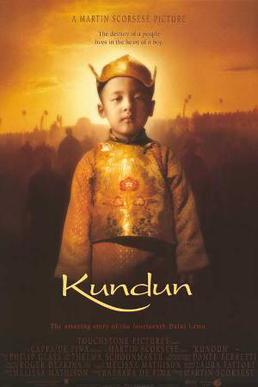
Kundun is a 1997 American epic biographical film written by Melissa Mathison and directed by Martin Scorsese. It is based on the life and writings of Tenzin Gyatso, the 14th Dalai Lama, the exiled political and spiritual leader of Tibet. Tenzin Thuthob Tsarong, a grandnephew of the Dalai Lama, stars as the adult Dalai Lama, while Tencho Gyalpo, a niece of the Dalai Lama, appears as the Dalai Lama's mother.
The Dorje Shugden controversy is a controversy over Dorje Shugden, also known as Dolgyal, whom some consider to be one of several protectors of the Gelug school, the school of Tibetan Buddhism to which the Dalai Lamas belong. Dorje Shugden has become the symbolic focal point of a conflict over the "purity" of the Gelug school and the inclusion of non-Gelug teachings, especially Nyingma ones.

Free Tibet (FT) is a non-profit, non-governmental organisation, founded in 1987 and based in London, England. According to their mission statement, Free Tibet advocates for "a free Tibet in which Tibetans are able to determine their own future and the human rights of all are respected."

Dreaming Lhasa is a Tibetan-language film by veteran documentary filmmakers, Ritu Sarin and Tenzing Sonam, who have been making films about various aspects of Tibet under the banner of White Crane Films since 1990. Written by Tenzing, a first-generation Tibetan born and brought up in exile, Dreaming Lhasa is perhaps, the first Tibetan feature film to explore the state of exile and the issues of identity, culture and politics as they affect the Tibetan refugee community in India.
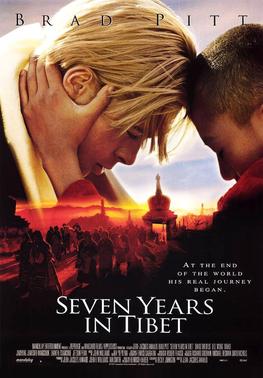
Seven Years in Tibet is a 1997 American biographical war drama film directed by Jean-Jacques Annaud. It is based on Austrian mountaineer and Schutzstaffel (SS) sergeant Heinrich Harrer's 1952 memoir of the same name, about his experiences in Tibet between 1944 and 1951. Seven Years in Tibet stars Brad Pitt and David Thewlis, and has music composed by John Williams with a feature performance by cellist Yo-Yo Ma.

Kumbum Monastery, also called Ta'er Temple, is a Tibetan gompa in Lusar, Huangzhong County, Xining, Qinghai, China. It was founded in 1583 in a narrow valley close to the village of Lusar in the historical Tibetan region of Amdo. Its superior monastery is Drepung Monastery, immediately to the west of Lhasa. It is ranked in importance as second only to Lhasa.
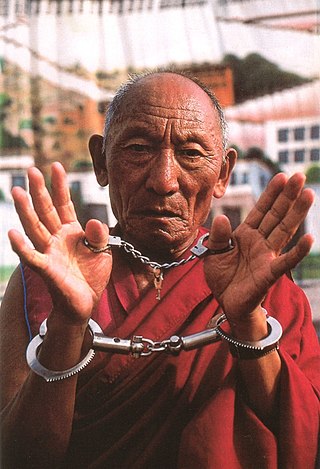
Palden Gyatso was a Tibetan Buddhist monk. Arrested for protesting during the Chinese invasion of Tibet, he spent 33 years in Chinese prisons and labor camps, where he was extensively tortured, and served the longest term of any Tibetan political prisoner. After his release in 1992 he fled to Dharamsala in North India, in exile. He was still a practicing monk and became a political activist, traveling the world publicizing the cause of Tibet up until his death in 2018. His autobiography Fire Under the Snow is also known as The Autobiography of a Tibetan Monk. He was the subject of the 2008 documentary film Fire Under the Snow.
Orgyen Kusum Lingpa (1934-2009) was a Tibetan terton and Nyingma lineage holder within Tibetan Buddhism. His name means "Holder of the Sanctuary of the Trikaya of Oddiyana Padmasambhava."
Khawa Karpo Tibet Culture Centre Charitable Trust is a non-profit organization that was founded on 16 April 2009. The organization is based in Dharamshala in Himachal Pradesh, India.

Tibet was a de facto independent state in East Asia that lasted from the collapse of the Qing dynasty in 1912 until its annexation by the People's Republic of China in 1951.

Protests and uprisings against the government of the People's Republic of China have occurred in Tibet since 1950, and include the 1959 uprising, the 2008 uprising, and the subsequent self-immolation protests.
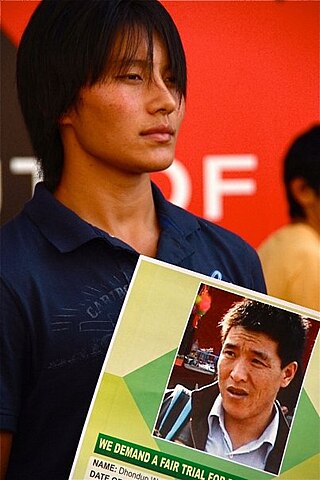
Leaving Fear Behind, also known as Leaving Fear behind: I Won't Regret to Die, is a documentary movie from Dhondup Wangchen and Jigme Gyatso about communist Chinese repression of Tibet. It was premiered in 2008 in the year when the 2008 Summer Olympics took place in Beijing, China.
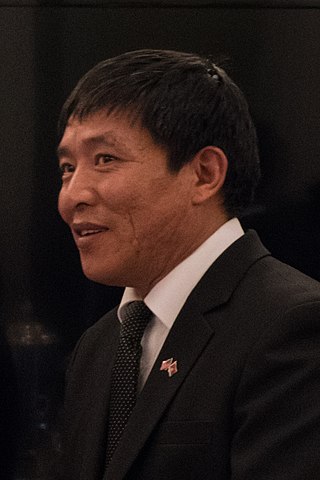
Dhondup Wangchen is a Tibetan filmmaker who had been imprisoned by the Chinese government in 2008 on charges related to his documentary Leaving Fear Behind. Made with senior Tibetan monk Jigme Gyatso, the documentary consists of interviews with ordinary Tibetan people discussing the 14th Dalai Lama, the Chinese government, the 2008 Beijing Olympics, and Han Chinese migrants to the region. After smuggling the tapes of the interviews out of Tibet, however, Dhondup Wangchen and Jigme Gyatso were detained during the 2008 Tibetan unrest.

Jigme Gyatso is a Tibetan activist of the Tibetan Independence Organisation who, in 1996, was sentenced to 15 years in prison on charges of "leading a counter-revolutionary organisation" and "inciting splittism". Two more years were added to his sentence in 2004 when he protested in jail. Several international human rights groups have protested or campaigned on his behalf, and Amnesty International has designated him a prisoner of conscience.

As of May 2022, 160 monks, nuns, and ordinary people have self-immolated in Tibet since 27 February 2009, when Tapey, a young monk from Kirti Monastery, set himself on fire in the marketplace in Ngawa City, Ngawa County, Sichuan. According to the International Campaign for Tibet (ICT), "Chinese police have beaten, shot, isolated, and disappeared self-immolators who survived."















